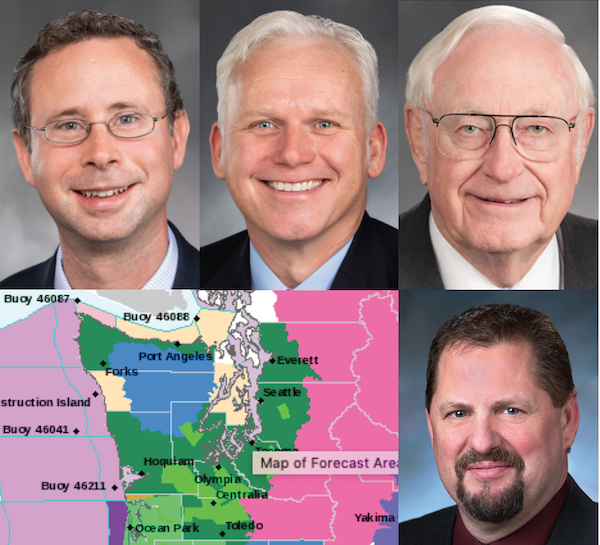
WDFW Commission In The Thick Of A Storm
Updated 7:15 a.m., January 7, 2022
Apropos of Northwest weather this week, Washington’s Fish and Wildlife Commission finds itself in the thick of a gathering storm.
Lawmakers are looking at new ways to remove and appoint members; they’ve also introduced a bill to stuff WDFW and its commission under DNR’s chief and strip the commission of its powers and make it an advisory board; an agitator is proposing an elected statewide WDFW commissioner; and a coastal sportsman who hopes to join the short-handed citizen panel appeared on an online broadcast Thursday evening to talk about it.

Let’s take these one at a time.
1) In a preseason warmup for the Olympia Outsider™, we’ll start with the three state senators who on Wednesday prefiled bills ahead of the start of the short legislative session this coming Monday.
SB 5656, sponsored by Sens. Jesse Salomon and Kevin Van De Wege, both Westside Democrats, would make new gubernatorial appointments to the commission subject to a pull-by date if the upper chamber of the legislature doesn’t like ’em.
“If the senate does not confirm an appointment within 12 months, the appointment to the commission expires and the governor must provide a new appointment,” the bill reads.
Currently, members can serve whether or not they’re confirmed by the Senate. The Senate’s natural resources committee – which Van De Wege chairs and Salomon vice chairs – can also bring in members for a chat and then issue a recommendation to the full Senate, which can then vote on the person. Or not.
The last time the Senate forced a governor’s hand on a commissioner – if I’m remembering my ancient history – was with the 2013 appointment-pull of Olympia’s David Jennings who was deemed “too much of a polarizing figure” by former Sen. Kirk Pearson.
The effect of the bill would be to give the Senate another way to toss commissioners – a slightly passive-aggressive one – after a trial period, per se.
Meanwhile, Sen. Jim Honeyford, a lower Yakima Valley Republican, offered SB 5661, which finds that a “contingency process for appointment is necessary to ensure that the commission is fully functional.”
The bill would allow Senate and House leadership to fill a seat if a member exits their term early and the governor hems and haws too long.
“If the governor fails to fill the vacancy within 60 days, the chair of each of the two largest caucuses of the senate and the two largest caucuses of the house of representatives must appoint a registered voter within 60 days to complete the term,” Honeyford’s bill states.
That would force the governor’s hand more quickly or, theoretically, allow for more of a compromise pick.
On a related side note, for over a year now Inslee’s office has not pulled the trigger on filling an available Eastern Washington seat, leaving Honeyford’s district and the rest of the 509 underrepresented.
The bill also would bar commissioners from serving without being reappointed.
Larry Carpenter’s term officially wrapped up in late October 2020, but the governor has left him on the board and early last month he handily won reelection as the chair on a unanimous 8-0 vote.
To be put into law, both bills would need to pass out of committee, the full Senate, go through the House and be signed by the governor, a bit of a taller order over the next 60 work days of the legislature.
2) In a Thursday bill drop, another Salomon and Van De Wege piece of legislation, SB 5721, focuses on “consolidating management of natural resources under the commissioner of public lands.”
It would strip WDFW’s commission of its authority to appoint the agency’s director and move that over to the commissioner of public lands, who is elected in a statewide vote and is a position now held by Hilary Franz, who oversees DNR.
The lands commissioner would also appoint the state parks director, and furthermore would appoint WDFW’s and State Parks’ commissioners who would “serve in an advisory role to the directors of the relevant agencies.”
That would move decision-making in-house, away from WDFW’s commission, which currently sets the agency’s policies.
Salomon’s and Van De Wege’s bill states doing so would “maintain strong public input into natural resource management issues while establishing a centralized and accountable structure for securing, managing, and enhancing the state’s natural resources.”
If memory serves (and I don’t quite think it does), the last time state lawmakers seriously looked to reorganize natural resource agencies was in 2010 when Gov. Christine Gregoire proposed consolidating WDFW into a superagency – called the Department of Conservation and Recreation – with the State Parks and Recreation Commission, Recreation and Conservation Office and the Department of Natural Resources’ law enforcement arm, as a way to deal with a large budget shortfall.
This new bill may have legs; given the two senators’ leadership positions on the natural resources committee, it “WILL immediately have some traction,” per a Hunting-Washington member who posted about it last night, while a source Thursday morning emailed to say, “Big red flags!” and termed it a pending “battle for survival.”
3) In a continuation of a campaign by preservationist- and litigious-minded environmental groups to “reform” management of all of the state’s natural resource agencies, an opinion piece that ran in the Spokane Spokesman-Review in late December called for an elected “commissioner of Fish and Wildlife,” someone who would be chosen in a statewide vote like Public Lands Commissioner Hilary Franz, who also chairs DNR’s oversight board.
Chris Bachman termed the recent resignation of WDFW Commissioner Fred Koontz – which followed his vote against the 2022 limited-entry spring black bear hunt despite no real conservation concerns from state managers, as well as controversial comments on Blue Mountains elk population levels – a “wake-up call to Gov. Jay Inslee, the legislature, our civic leaders, and the public that it is time to rethink the mandate and governance structure of the Fish & Wildlife Department. It is time to rethink the priority and design of all our state natural resource agencies.”
Bachman et al have been urging Inslee to stuff the commission with more “reform-minded” members like Koontz and Lorna Smith. Currently there are two vacancies.
WDFW’s current commission came out of 1994’s merger of the old Departments of Wildlife and Fisheries and a 1995’s statewide 62 percent to 38 percent vote that attempted to remove politics from critter management by leaving the hiring of WDFW’s director to the governor-appointed members of the panel; what’s also notable about Initiative 45 is that it passed by wide margins in every single county. At the time Washington politics were more competitive than it is these days. Members are supposed to represent a “balance reflecting all aspects of fish and wildlife, including representation recommended by organized groups representing sportfishers, commercial fishers, hunters, private landowners, and environmentalists.”
4) And speaking of politics, the commission and vacancies, Brian Blake was a guest of Duane Inglin on Thursday evening’s live streaming Fish Hunt Northwest show, which began at 6 and is also on YouTube.
For those who don’t know, Blake represented Washington’s South Coast in the House of Representatives for years before losing office in 2020’s conservative sweep of the region, and he also chaired the lower chamber’s natural resources committee, through which many WDFW-related bills must pass.
Over the past month, Blake and allies in the hunting world have been pushing his name forward as a potential new “at-large” commissioner, replacing Koontz. It’s sparked a good if also bruising debate in a now nine-page thread on Hunting Washington. Some find it hard to square the Aberdeen man’s political-party affiliation with his rock-solid support of hunting.
I mean, how many Washingtonians have the huevos to not only propose hunting at select state parks – already allowed in some East Coast states – but get it out of committee on a 9-2 vote all while Fairview Fannie sends highballs your way?
That was back in 2015, during a legislative session that will also be long remembered by some for Blake’s stalling of a highly coveted recreational angling prioritization bill. Strongly associated with commercial fishing, he said of his opposition to HB 1660, “Puget Sound has had the sports priority called for in the legislation for twenty years and I do not want the piss poor chinook and coho fishing that occurs now in Puget Sound to become the norm in my fishing areas.”
All that is to say, there’s a lot to mull and I couldn’t agree more with Duane Inglin when he wrote of his show’s episode, “People need to hear what Brian Blake has to say…”
As the events I’ve covered over the last year show, the commission and everything surrounding it bear very close watching by Washington hunters and anglers.

